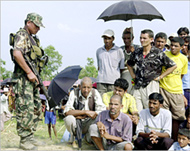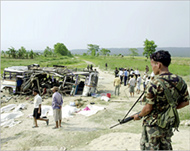Nepal blast triggers hunt for Maoists
Nepal’s security forces have begun hunting for Maoist rebels who are suspected of blowing up a bus that killed at least 53 people, most of them civilians.

At least 72 people were also wounded in Monday’s attack at Madi village in the Maoist-controlled district of Chitwan, about 180km southwest of Kathmandu, the army said.
“The search to locate the culprits is continuing but they normally blast or attack and run away,” said Major Sushil Dahal.
The blast was one of the bloodiest attacks on civilians by suspected Maoist rebels since their revolt began nine years ago.
An army officer said the bus was torn apart by the force of the blast and that the passengers were badly mutilated by shrapnel as well as by shards of metal and glass from the bus.
Death toll
 |
|
There was no immediate claim of |
“(The bus) rose into the air … quite high and came down and split into two,” the officer said, quoting witnesses.
State radio and officials gave the death toll as 53 but said it could rise.
The radio report, quoting police Superintendent Surendra Bahadur Shah, said that seriously injured people had been transferred to hospitals in Kathmandu for treatment.
Shah said the attack was the work of “terrorists”, a word which the police and military in Nepal use to describe Maoist rebels.
Search operations
Officials said many of the victims were women and children, and that three military personnel on their way home for vacation were among the dead.
The military cordoned off the scene so medics and family members could search for items that could prove helpful in identifying the victims, officials said.
|
“(The bus) rose into the air … quite high and came down and split into two” |
Witnesses at the scene said the explosion left a hole in the dirt road 5ft across. The charred and twisted bus had been pulled into a nearby field.
Homemade bomb
An army officer in Chitwan district, who declined to be named, said that a homemade bomb planted in the road was used by the suspected rebels to blow up the bus.
“As the bus came near, the improvised explosive device was set off by remote control,” he said.
“The bodies of the dead were badly mutilated or blown to pieces by the explosion,” another officer said.
There was no immediate claim of responsibility from the Maoists, who have been fighting to install a communist republic in Nepal since 1996. The insurgency has already claimed more than 11,000 lives.
 |
|
Police suspect the explosion was |
The rebels are generally not known for launching indiscriminate bombings of civilian targets, although they have been accused by human rights groups of the torture and murder of villagers they believe to be collaborating with the armed forces.
Road blocks
UN Secretary General Kofi Annan called the deaths senseless.
Annan called in a statement “for an immediate end to such utterly reprehensible tactics that expose civilians to danger in the conflict in Nepal.”
The Maoists have stepped up their campaign through road blockades and attacks on troops since King Gyanendra sacked the coalition government, imposed a state of emergency and assumed absolute power on 1 February, saying it was necessary to tackle the insurgency.
Army spokesman Brigadier-General Dipak Gurung said last month the security situation in Nepal was “definitely better today” than before the king sacked the government for failing to control the Maoists and hold elections.
“We are able to focus more on our main job” of fighting the insurgency rather than containing civilian disturbances, said the general.